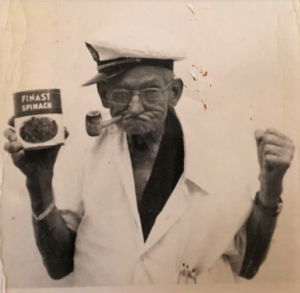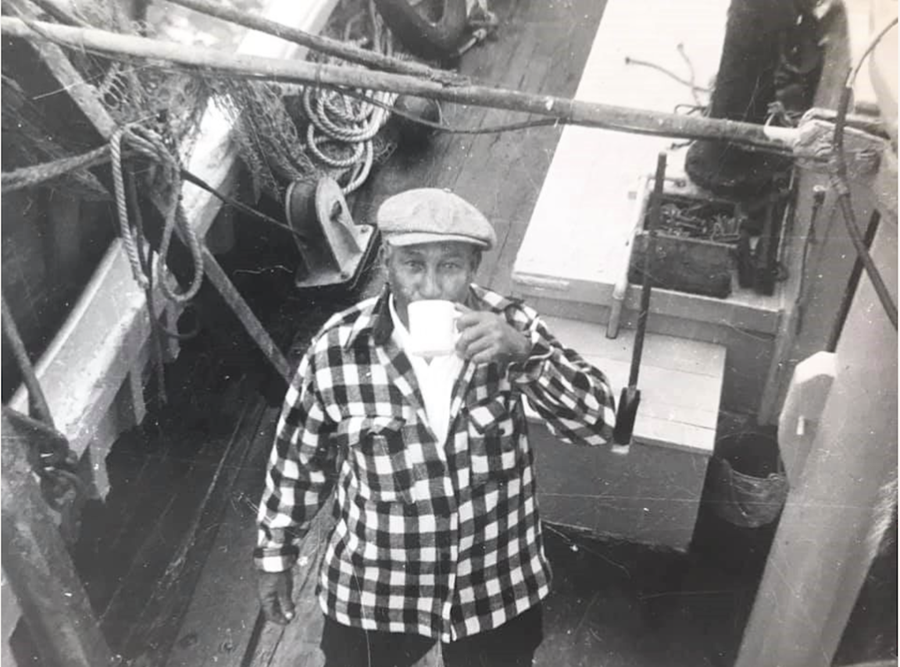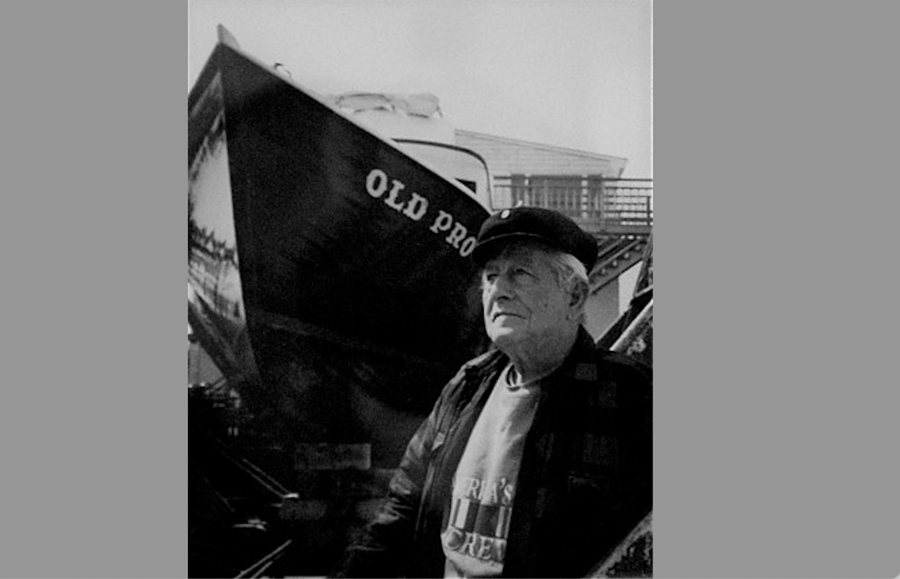Lisa King, a local Provincetown historian who describes herself as a “West-End girl,” grew up hearing stories full of townspeople remembered by their nicknames. Some were straightforward references to people’s roots, like Sam “the Greek” Janoplis, Clarence “the Swede” Nelson, or Manuel “Pop Rabbit” Coelho — coelho is Portuguese for rabbit.
Others were cracks about someone’s looks. David Scott was nicknamed “Popeye” for his resemblance to the cartoon character — a similarity he embraced, apparently. In a photo, Scott grips a can of spinach and holds a pipe in his mouth.
King has compiled a list of locals’ nicknames. There are 841 names on it so far — it’s still a work in progress. Many of the nickname-bearers lived here in the early 1900s. The 1930s also seem to have been a popular period for earning nicknames. And some modern-day Provincetown residents are known by odd monikers, too.

“It’s a labor of love,” says King of her list. For the last three years, she has paged through old books, first editions, newspapers, and yearbooks to dig up and confirm the names people here have been known by. The Find a Grave website proved to be a resource, she says, because nicknames were frequently included on grave markers.
Each time she adds a significant number of new names to the list, King copyrights the list and posts it on her Facebook page, My Grandfather’s Provincetown. Posting the list has helped her refine it.
“The public has commented and corrected,” King says. “The townspeople had a big hand in this.”
Nicknames were particularly prevalent among Provincetown’s Portuguese, says King, whose family goes back generations in this fishing community. In Portuguese families, she says, first names were often passed down, resulting in fathers, sons, and cousins with the same names. “The 1886 Provincetown Directory lists seven men named Frank Silva, eight men named Joseph Silva, and six men named Manuel Silva,” she says.
Nicknames were necessary, and they often reflected people’s personality quirks, occupations, or events that befell them. In her research into the names, “the hard part was finding their origins,” King says.

Some nicknames predated their bearers’ arrivals in Provincetown. Joe “Cow” Corea was one that remained a family nickname through three generations. The first Joe Corea was born in the Azores in 1884. His family owned a dairy, and as a child Joe would walk a cow from house to house, selling milk fresh from the udder.
He came to Provincetown as a young man, started a family with his wife, Virginia (Perreira), and worked as a fisherman. Corea, who died in 1967, went by “Papa Joe,” King says. But the nickname from his homeland was not forgotten. Corea’s son and grandson were both named Joseph and bore the nickname “Joe Cow.”
Manuel “Manny” Zora was something of a Provincetown celebrity — he was known as “Sea Fox.” According to local histories, Zora was born in Portugal in 1895 and arrived in Provincetown in his mid-teens. He made his living as a fisherman but is most remembered for his rum-running adventures. The Coast Guard was never able to catch Zora with the booze on board.
The fishermen knew these waters well. “Zora would go out at night,” says King. “He’d shut off his lights and navigate through the harbor in the dark. He never got caught.”
Irving Roderick, a lobsterman and commercial fisherman who died in 2002, was nicknamed “Wyatt Earp,” says King, “because he looked like him when he was young.” In the 1980s, sculptor Mary Bono used molds of Roderick’s face and hands to fashion a wax figure of an Azorean fisherman for a display at the Provincetown Heritage Museum.
Opinions differ on how Francis Santos, a Provincetown native who died in 2015 at 100, came by the nickname “Flyer.” King tracked down one story about the source of the name in a 1952 Provincetown Advocate article: “Asked why he was known to everyone in town as Flyer, the boat-builder Santos said that as a kid he was interested in and talked a lot about flyer machines.”

Flyer Santos built and repaired boats as owner of Flyer’s Boat Yard. In 1953, Santos helped to found the West End Racing Club, and in 1977 he built the model of the Rose Dorothea schooner displayed on the second floor of the Provincetown Public Library. The Cape Cod Times reported that Santos said, during an interview in 2000, that he earned his nickname because he never sat still and was always “flying around.”
Charles “Stormy” Mayo, who co-founded the Center for Coastal Studies in 1976, provided the Independent with an account about the origins of his nickname.
“My parents were taking their schooner, The Blue Sea, up to Provincetown,” says Mayo. They were coming from the Caribbean. Stormy’s mother was pregnant with him, but the couple thought they had time to complete the trip.
Then a huge gale hit, so Mayo’s parents docked their schooner in Washington, D.C. and that’s where Mayo was born soon thereafter — the only member of his family not born on Cape Cod in 10 or 11 generations, he says.
His given name is Charles, like his father and grandfather, but Mayo’s father nicknamed him “Stormy” the night he was born. “It’s hung with me ever since,” he says. “I’ve never really had any other name.”
Mary Heaton Vorse included a handful of nicknames in her 1942 book Time and the Town: A Provincetown Chronicle. She claimed that the nicknaming custom came from São Miguel Island, in the Azores.
“Louis Chocolate, whose tan was doubled by tarring nets, has a flock of little Chocolates,” Heaton Vorse wrote. Present-day Provincetown resident Christina Tarvers said that nickname was given to her grandfather.
Also included by Heaton Vorse were people dubbed “Mrs. Jazz Garters,” “John Bull,” “Tony Fall River” and “Manny Bigfeet.” She ended her discussion of nicknames by mentioning “the Goddamn family, with Tony Goddamn and Manny Goddamn.”
Nicknames could be rude. On King’s list, one particularly stern woman in town was called “Mary Hot Times.” King declines to be more specific about the woman’s identity. “I try to be sensitive,” she says. “It’s all in good fun, but a lot of feelings were hurt.”



